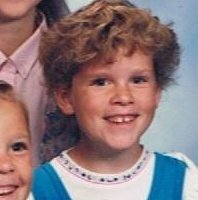I love the movie The Lost Boys. It may be a little campy and a tad predictable, but it’s still a great movie. It has a great style, amazing soundtrack, vampires who are real vampires although they look like 80’s rock stars, humor to play off the horror aspects (which are really rather mild), and did I mention the awesome 80’s hair? But what I like the most about this movie is the focus on the family.
Yeah, a horror movie about teenage vampires has themes of
familial love and actual grown up characters that play a role in the
story. The teenage MC has a brother and
mother and even a grandpa who all play a role in the storyline, and somehow the
movie still works. Seems to me that YA
paranormal romances and urban fantasy with the disturbing lack of parents could
learn a thing or two from the movie Lost Boys.
The Missing Parent
Syndrome in YA
I’ve read a lot of YA mostly urban fantasy, paranormal
romance, and dystopia, and there are so few decent parents in any of the books.
In Hush, Hush, Nora’s mother leaves her
alone in an old farm house for weeks at a time while she’s on business trips. In Hunger Games, Katniss’ mother had a
nervous breakdown after the father died and was pretty much useless. In City of Bones, Clary’s mother gets
kidnapped. In Everneath, Nikki’s dad is
running for mayor and doesn’t seem to have any time for his daughter who
disappeared for six months other than making sure she takes drug tests and
works at a soup kitchen for PR reasons. And while Charlie in Twilight was at least a
fully formed character, he’s not going to win father of the year with all the
times he ditches Bella to go fishing on his days off. I have seriously tried to think of one story
that had good parents, and the only one I could think of was Matched by Ally
Condie.
As a parent, I find
this disturbing. As a writer, I see this
as a missed opportunity. Why not include
concerned, meddling parents? They can
bring more tension or complicate the plot.
If the MC told their parents about their new discovery of vampires,
werewolves, or fairies, the parent is most likely going to think the MC is
crazy or on drugs, so it is believable that the MC wouldn’t tell them, and even
if they did, the parents could not believe them or even make things worse. Why not have the parents ground the MC on the
night their supposed to save the world because of all the sneaking around
they’ve been doing lately? I think a
caring, involved parent could play an interesting role in the story. At least it is worth considering.
 |
Have you seen me?
Lost, a caring, loving parent in YA literature |
Excuses for not
including Parents in YA
There are a lot of reasons not to include parents in YA. But to me it all boils down to wanting the characters
to have more autonomy, which is funny to me because this could easily be solved
by moving the characters to college age, but for some reason no one wants to
read about college-aged protagonists, so instead there are these high school
protagonists living and behaving like college students. I think if you have a protagonist in high
school their lives should reflect someone in high school, and that includes
those pesky parents.
Here are some common excuses to keep the parents out of the
story.
Teenager MC needs to be
the one to solve the problem. Sure
the MC needs to solve the problem. I
guess the idea is that if there are diligent, caring parents around that they
will solve all their kids’ problems for them.
I wish that was true. My oldest
is only seven, and I can already see that there are some problems I can’t fix
for her. I’m sure that I will become
more and more powerless as she gets older.
I think that is how we grow up.
And I know the more serious life-threatening things would warrant
parental involvement, but that would only happen if the MC actually told the
parent.
When I was a teenager I hardly ever told my parents about
what was going on in my life, and I think
most teenagers are like that. I’m
sure there are exceptions and some teenagers who tell their parents
everything. I hope my kids are like
that, but it seems very realistic to me that teenaged character would keep
things from their parents. If the
situation involves a supernatural element, the teen would be even more unlikely
to confide in their parents for fear their parents wouldn’t believe them.
And if the MC is in a life and death situation there are a
lot of adults they could go to:
teachers, police, friend’s parents, aunts and uncles, etc. So making the parents unavailable does not
force the MC to solve the problem on their own.
There has to be another logical reason for the teenaged characters to
not go to any adults.
My point is that there are a lot of ways to force the
teenage characters to solve the problem even if they have good, attentive
parents. And it might be more
interesting and complicate the plot to have the characters have to sneak around
their parents to save the world or hook up with their dangerous, supernatural boyfriend.
Parents aren’t
important to the story. Sometimes
the parents aren’t important to the story, and while it is true that you
shouldn’t include or spend much time on characters that aren’t directly related
to the plot, having well-developed and believable parents adds depth and
realism to the story. If you have a
character in high school, who is still living with their parents (or parent),
it is unrealistic not to have the character interact or at least think about
their. Parents also play a pretty significant role in
who a person becomes, and I always appreciate the added depth when an author
takes the time to develop the parent, and shows me hints of the MC’s childhood
and where the character came from. So I
think even if the parents doesn’t play a direct role in the plot, they still
impact the story. And showing the
parent-child relationship is important.
Some parents are not
good parents. Yes, some parents
aren’t very involved in their kids’ life.
They could have demanding jobs or be a little self-centered or even neglectful. All of these happen in the real world. And honestly, I don’t have a problem with
having inattentive parents. This can be
done very well. In Holly Black’s White
Cat, the main character Cassel comes from a family of con artists and
mobsters. His mother is in prison for
running a scam. She is absent and also a
bad parent. This is integrated perfectly
into Cassel’s character (explains why he is the way he is) and feeds into the
plot. It is believable, and actually
pretty brilliant. And Katniss would not
have the survival skills she needed if her mother hadn’t broken down out after
her father died and forced Katniss to provide for the family, Katniss would
never have had the survival skills to win the hunger games. So having a bad parent can definitely work
for the story.
But a lot of times I see evidence of a neglectful parent,
like in Hush, Hush, but I don’t see how the mother’s lack of parenting impacts
the character. If the only reason for
bad parenting is to get rid of the parent, that is lazy writing. If you want to have a neglectful parent, make
sure you show the repercussions of it.
Parenting in The Lost
Boys
I know this is an older movie, and I’m not sure if everyone
has seen this movie, so I’ll try not to spoil it. If you haven’t seen it, I suggest you do even
if you’re not a fan of horror. Honestly,
I don’t think it is that scary although it is a bit gory at times. It is actually pretty funny.
It also is very similar to YA. It’s about a mother who moves her two sons
(both teenagers) across the country to live with her father after her
divorce. The whole story is centered
around the oldest brother, Michael, trying to fit in with a new dangerous gang
and impress the hot chick that hangs out with them. Of course they all turn out to be vampires
and are trying to turn Michael into a vampire as well. These vampires are really living the
teenage fantasy. No parents, no rules,
dress like rock stars and drive expensive motorcycles. They “sleep all day, party all night, never
grow old. Never die” (tag line from the movie).
I liked these vampires in that they definitely had bite, no angst just
party animals that kill without any remorse.
What keeps Michael from being seduced into the vampire way
of life is his strong bonds with his family.
He has his brother Sam who he has as close of a relationship with as
you’d expect two teenage boys to have.
Sam kind of tags along and takes cheap shots at Michael, but it is clear
that they look after each other.
Micheal’s mother is kind of an ex-hippie type, very sweet,
very loving, but not great with discipline.
She is genuinely concerned about the change in Michael’s behavior and actively tries to connect with him. She's a real character, not a cardboard excuse for the boys to be left alone. They’re teenagers; it’s normal for them be on their own at times. But
the Mother isn’t absent. She is there,
and she is trying. We see that in the
movie.
There is also a grandpa who is less involved. He is a great character, a taxidermist who is used to living alone,
a bit of a recluse. The boys steal his
car and try to get rid of him when the vampires are coming after them. For the most part he is a realistic obstacle
for them to get around rather than someone to go to when they need help.
I don’t want to give away the ending, so I’ll stop
here. But while the plot revolves
around the brothers, the mother and grandpa both play a significant part in the
story, and I think the movie is stronger because of this.
If absent parents play a significant part in your plot line,
then, by all means, get rid of them, but make sure their absence is felt. However, if it doesn’t, consider keeping the
parents around. Try work them into the story or have them complicate the MC’s life a little. I think it might be worth a little effort to find those lost parents.
~MaryAnn






.jpg)






